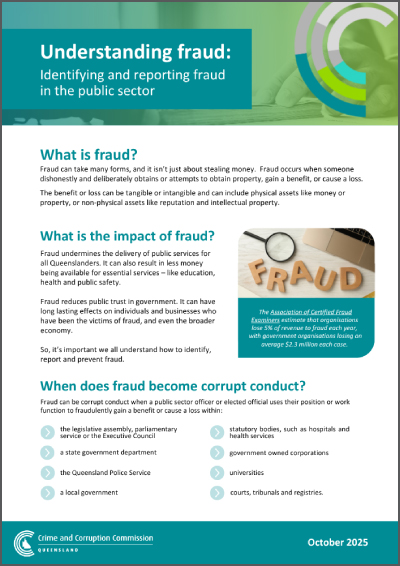It highlights common behaviours and warning signs to look out for, as well as the potential consequences fraudulent behaviour can have for you or your agency. Knowing how to identify potential fraud in the Queensland public sector can give you the confidence to report it. View a PDF version of this information that you can print or share. |
What is fraud?
Fraud can take many forms, and it isn’t just about stealing money.
Fraud occurs when someone dishonestly and deliberately obtains or attempts to obtain property, gain a benefit, or cause a loss.
The benefit or loss can be tangible or intangible and can include physical assets like money or property, or non-physical assets like reputation and intellectual property.
What is the impact of fraud?
Fraud undermines the delivery of public services for all Queenslanders. It can also result in less money being available for essential services – like education, health and public safety.
Fraud reduces public trust in government. It can have long lasting effects on individuals and public and private sector businesses who have been the victims of fraud, and even the broader economy.
The Association of Certified Fraud Examiners estimate that organisations lose 5% of revenue to fraud each year, with government organisations losing on average $2.3 million each case. |
|---|
So, it’s important we all understand how to identify, report and prevent fraud.
When does fraud become corrupt conduct?
Fraud can be corrupt conduct when a public sector officer or elected official uses their position or work function to fraudulently gain a benefit or cause a loss within:
- the legislative assembly, parliamentary service or the Executive Council
- a state government department
- the Queensland Police Service
- a local government
- statutory bodies, such as hospitals and health services
- government owned corporations
- universities, or
- courts, tribunals and registries.
Corrupt conduct includes actions that impact one of the previously listed entities by:
- adversely affecting their performance, ability to exercise functions or powers.
- resulting in their performance or exercise of their powers in a manner that is dishonest, lacks impartiality, knowingly or recklessly breaches trust, or involves the misuse of information.
Corrupt conduct can also involve conduct that impairs, or could impair, public confidence. For example, collusive tendering, dishonestly obtaining public funds, or fraudulently obtaining or retaining an appointment. This conduct extends to any person and applies regardless of whether the person holds or held an appointment.
Corrupt conduct would, if proven, constitute a criminal offence, or disciplinary breach providing reasonable grounds for dismissal.
What are the consequences?
Fraud is a serious criminal offence and can lead to significant penalties, including imprisonment, fines or community service.
If proven, fraud that is also corrupt conduct is a disciplinary breach that can result in a public sector officer being dismissed.
Anyone who tries to corrupt a public sector officer can also be found to have engaged in corrupt conduct, which may also be a criminal offence.
Many forms of fraud and corruption are offences under the Criminal Code 1899 (Qld). These include offences such as official corruption, false claims, stealing, issuing false certificates, receipt or solicitation of secret commissions, forgery and election fraud.
What does fraud look like?
Some common examples of fraud involving the public sector include:
- Creating false documents or fabricating information to apply for or support a grant application
- Avoiding paying taxes, levies or fines that reduce state revenue
- Providing fake qualifications or information about work experience to get a job
- Stealing or misusing payments, grants or services a person is entrusted to manage
- Wrongly using government equipment for personal gain or the benefit of someone else
- Making false claims when submitting timesheets, overtime, travel allowances or leave
- Favouring certain suppliers or awarding a contract to a company belonging to a partner, friend or associate without declaring a conflict of interest.
What are the warning signs?
Fraud can be opportunistic or organised and can often be hard to detect.
The Commonwealth Fraud Prevention Centre has identified eight common behaviours to be on the lookout for. These include:
- Deception – Do they act deceptively, dishonestly or are misleading to make others believe something that is not true?
- Recklessness – Do they act recklessly or with no regard to the consequences of their actions or the effect their actions may have on others?
- Concealment – Do they deliberately hide and conceal their actions to prevent them from being uncovered?
- Coercion – Do they improperly attempt to influence or offer bribes or inducements to others?
- Exploitation – Do they exploit weaknesses in systems and controls for a wrongful purpose?
- Organisation – Do they take a planned and coordinated approach to acting fraudulently?
- Impersonation – Do they assume another’s identity to obtain a benefit?
- Fabrication – Do they make false claims, lie and produce false documents?
Being alert to these fraud warning signs will help you to better detect and prevent it from occurring.
How do I report fraud?Anyone who suspects fraud or corruption is happening, or has happened, within or involving any public sector agency can report it directly to us by using our online form. If you are a public sector employee, you can also report it through your agency’s complaint handling processes. All public sector agencies have an obligation to notify the CCC of reports of suspected corruption they receive. Information on how to report corruption can be found here. Once we have assessed your complaint, you will get a letter or email from us letting you know what we will do about your complaint (unless you have chosen not to provide your contact details). |

 This factsheet provides information about fraud and what impact it can have in the Queensland public sector.
This factsheet provides information about fraud and what impact it can have in the Queensland public sector.